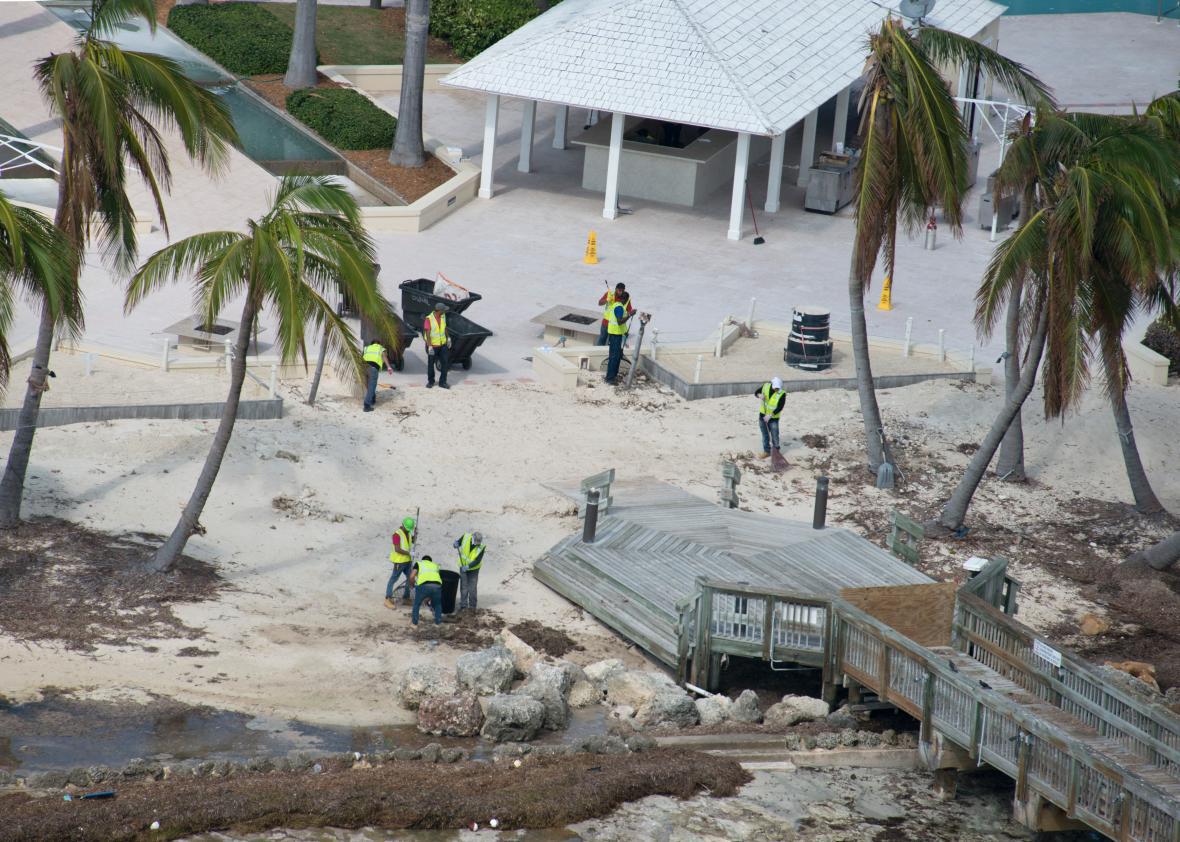After seven years on the up, the U.S. economy took a big hit in September. Some 33,000 jobs were lost, according to the latest monthly report issued by the Bureau of Labor Statistics. While there are plenty of factors at play, from the man in the White House to the insistent specter of nuclear war, experts attribute part of the autumnal dip to extreme weather.
Because of natural disasters like Hurricanes Harvey and Irma, the government reported, a whopping 1.5 million Americans were unable to work in September. Business owners in Texas, Florida, and elsewhere put new hiring on hold, and many industrial plants in storm-ravaged communities are still offline. But economists say the take-home message is clear: Things will return to normal. As the New York Times reported, economists are certain the U.S. labor market is fundamentally strong.
Some climate change researchers aren’t so certain, though. As “normal” grows nebulous and once-rare weather events become stronger and more frequent, it’s hard not to wonder if September’s inclement job numbers are not a fluke, but a preview.
Moustapha Kamal Gueye of the U.N.’s International Labour Organization says it’s looking like a bit of both. “The question is, ‘How frequent will [external shocks] be in the future?’” he said. “If these happen once in a year, then one could discount it… But if they happen twice, five times a year, in many places around the world?” Well, then they’re not aberrations, they’re a new reality.
Depending on where you live and what kind of work you do, Gueye says this brave new world could look rather different. People who depend heavily on natural resources will be the hardest hit. In fact, they already are. In the Caribbean, at least 2.3 million people work in the $35 billion tourism industry, which largely relies on, well, a natural resource of sorts. This hurricane season has totally upended this crucial sector of the economy, causing cancelled reservations and ravaging infrastructure. Senegal, a coastal African nation which similar relies on tourism dollars, is also seeing a decline in its tourism, due to the diminishment of its major tourist attraction—its beaches—thanks to sea level rise, erosion, and resource mismanagement, as Reuters reported.
Agriculture is also threatened by the both the slow creep and sudden debilitating outbursts of climate change. Many jobs were burned to a crisp in the recent California wine country wildfires, which are increasing in frequency as the West warms. And as overfishing, ocean acidification, and swelling dead zones destroy fish populations, the fishing industry is increasingly imperiled. Because neither the fisherman nor the farmer lives in a vacuum, the other people in their economic ecosystems are threatened. Gone are the bait and tackle salesman, the boat builder, and the shore-side restaurateur. Gone, too, could be a source of protein that 1 billion people rely on.
While nothing looks good, it doesn’t actually look all bad. In areas that will be more regularly affected by natural disasters, we could see the rise of a rebuilding gig economy. After Hurricane Katrina, the Times reported, the job market took some time to rebound, but the task of putting New Orleans back together eventually stimulated employment:
Employment gains averaged 249,000 in the six months before the storm. After New Orleans found itself underwater, gains averaged 76,000 over the next couple of months before soaring to 341,000 in November 2005.
These aren’t as desirable as more permanent positions, but remaking damaged cities and disaster-proofing could become big business. As many people slowly trickle out of communities besieged by extreme weather, more resilient communities could see immense growth, stimulating their own climate-caused construction boom.
There’s also the question of the jobs “lost” to a greening economy. Trump campaigned in part on the premise the Paris Climate Accord were a “bad deal” for the country. This framing, that greening the economy is a job killer, is false: There are jobs lost in the fossil fuel industry, but the jobs gained in the renewable energy sector more than make up for that. As of September, the Bureau of Labor Statistics reports, just 52,000 Americans made up the entire coal industry. By contrast, Slate’s Dan Gross reported in June, Tesla was seeking to fill almost 2,000 jobs—and that was just one company. (As of May 2017, more than 800,000 Americans were employed in the renewable energy sector.) Last month, PRI’s The World reported that West Virginia, where many young people thought they’d grow up to be coal miners, are actually finding work in the booming solar energy industry.
As the evidence and cost of climate change is piling up, our president may be willing to put his head in the sand, but ordinary Americans are starting to take notice: A recent poll suggested that 85 percent of Americans say they believe manmade climate change played some role in Hurricanes Harvey and Irma. Connecting the dots between climate change, natural disasters, and a depressed economy might take time, but as it becomes increasingly apparent, there will be an anxiety to follow. Trump ran on saving our economy—is he willing to acknowledge one of the major threats to it?
